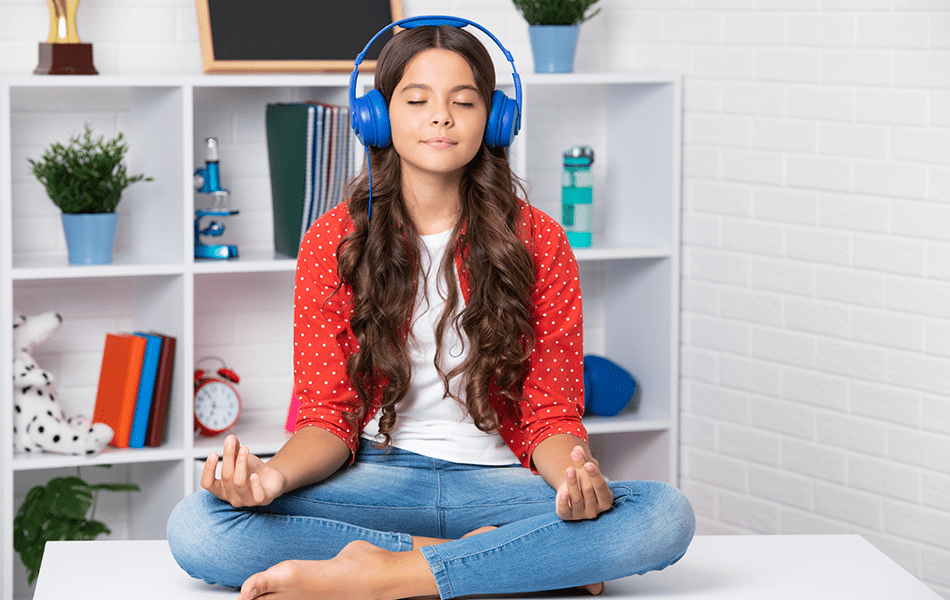The power of music as an art form is undeniable. It may get more attention for motivating people to dance, but it also offers an easy technique to enhance sleep hygiene, which improves your ability to fall asleep more quickly and feel more refreshed overall. Meditation music has been shown to assist people in falling asleep by promoting a state of relaxation and calmness. It is currently simpler than it has ever been to take advantage of the power of music wherever you go by using streaming applications and portable speakers. Given how easily accessible meditation music is and the potential effects it may have on one’s quality of sleep, it may be a good time to give it a try by incorporating it into your bedtime routine.
Both meditating and listening to music can be very beneficial to one’s health in a variety of different ways. Both hobbies are relaxing and transformational. Both music and meditation have been demonstrated to have a positive impact on people’s mental and physical health, as well as their feelings.
How do Music and Meditation Heal?
It Protects and Keep your Heart Safe
Meditation practice can reduce cardiovascular risk biologically by lowering heart rate, blood pressure, adrenaline, and the stress-related hormone cortisol. People who meditate are less likely to experience a heart attack or stroke or die within five years..
Increase Sleep Quality
After six weeks of mindfulness meditation practice, older individuals who had difficulty falling asleep reported fewer feelings of fatigue and insomnia. Mindfulness meditation and music, which emphasize present-moment awareness and breathing, promote greater sleep quality by making it simpler to stimulate the body’s relaxation response at night.
Lift your Mood
Dopamine, the brain chemical that is linked to feelings of pleasure and reward, is released when you listen to music, which lifts your mood. When someone has mild depression, mindfulness meditation music may help the listener’s mood feel better, reduce their stress symptoms and depression, and reduce their risk of developing major depression.
Reduce Anxiety
Imaging studies of the brain have shown that areas of the brain associated with executive function and the regulation of worrying are active during mindfulness meditation and music, which helps to reduce anxiety and has been shown to have this effect.
Is It Possible that Music could Help You Fall Asleep?
Most people find that listening to meditation music helps them fall or stay asleep. Sleep playlists are available on the music streaming site Spotify, and they claim to be able to assist users in falling asleep at night. Listening to meditation music at night is not a one-size-fits-all activity; options range from tunes designed to make listeners feel sleepy to bedtime stories geared toward adults. It’s possible that listening to meditation music can help you drift off to sleep more easily. Research has shown that participants who listen to meditation music before bed report having a more restful night’s sleep. However, the self-reported quality of sleep does not necessarily indicate that the sleep was of higher quality. A person’s expectations may have a role in how music influences their quality of sleep. Listening to music before bed may be beneficial for certain people. According to the findings of a number of studies, listening to meditation music that is slow and relaxing can slow the heart rate, relax and meditate the body, lessen feelings of worry and tension, or just serve as a distraction from stressful thoughts that keep one awake at night.
So, what genre of music do you think you should go with?
In this article, we’ll go deeper into the beneficial health effects of meditation music and how listening to certain types of music can help you get a better night’s sleep.
7 Relaxing Genres to Play for your Evening Meditation Music Genre
1. Music for healing and sleep, based on the Solfeggio frequencies
Solfeggio frequencies, also known as certain sound tones, are utilized to assist in the healing of various elements of physical, emotional, and mental well-being. Research has even demonstrated the efficacy of these frequencies as a healing modality. When you listen to different Solfeggio frequencies before going to sleep, you may experience a variety of beneficial effects on your health. It has been demonstrated that sleep ambient music with a frequency of 432 hertz can lessen the rate at which your heart beats, and sleep music with a frequency of 528 hertz can lower levels of stress. It’s possible that you won’t even notice the Solfeggio frequencies when you listen to ambient music that utilizes them. In order to combine the beneficial effects of both of these forms of music, you can even layer them on top of one another.
2. Instrumental Music
Real instruments are used in instrumental music, while voices are often not included in the composition. It goes without saying that not all forms of instrumental music are conducive to falling asleep; in fact, some of it can be very cheerful and stimulating. But listening to ambient music with a slow tempo and instrumentals can help you unwind, meditate and relax without the distraction of lyrics or other sorts of vocals. This category of music includes pieces played on the piano and can be classified as piano music as well as those performed by orchestras. More so than modern music, listening to classical composers like Mozart and Strauss helps bring down your blood pressure. However, listening to other kinds of music, such as melodies from Celtic music, can also be an effective way to help you relax yourself before bedtime.
3. Nature Sounds
Do you find that you are more likely to fall asleep when you are exposed to white noise, such as by turning on a fan or listening to other kinds of nature noise? Or do you find that the music sound of the rain on your roof helps you fall asleep more quickly? In such case, sleep music that includes the nature sounds or other sound effects can be a good option for you to try in order to ease into a more peaceful mood. If you find that stress is keeping you from getting a good night’s sleep, one solution is to listen to the soothing sounds of nature music, such as the sound of crickets chirping, an evening spent in a quiet forest the sound of a gently breeze or imagine that you are being washed over by the ocean while listening to a music lullaby and hearing the sound of nature waves lapping on the shore. Listening to the sounds of nature can help mitigate the physiological and psychological well being effects of stress by lowering blood pressure, slowing the pulse rate, and restoring a more natural rhythm to breathing.
4. Binaural Beats and Isochronic Tones
There are many different kinds of relaxing music sounds, not just those with solfeggio frequencies, that can help promote healing and lead to improved sleep. Binaural beats are a type of auditory stimulation in which two distinct frequencies are played, each in a separate ear. When you listen to these two distinct tones at the exact same time, your mind will generate a third “beat” on its own. Since binaural beats can only be experienced by listening to them through headphones (which allow the listener to hear both frequencies at the same time), if you listen to music through speakers while you go to sleep, your brain won’t be able to pick up on the beats that the music is producing. Binaural beats can assist you with a variety of impacts, depending on the frequency that you use. Theta waves (3–8 Hz) and delta waves are more effective for inducing sleep when used in sleep music. (0.5-3 Hz). Isochronic tones, on the other hand, don’t rely on two distinct beats like regular tones do, so you can listen to them whether or not you have headphones on, which is useful if you don’t want to fall asleep while listening to music. Instead, they are single tones that are repeated at preset intervals that are spaced equally apart from one another.
Experiment with different kinds of music to find out which ones help you fall asleep faster or stay asleep longer so that you may enjoy the restorative benefits of a deep sleep. After you have identified the songs that are most effective in getting you to sleep, you may compile them into a playlist that you can play repeatedly during your downtime.
5. Classical Music
Classical music is characterized by its slow tempos, elegance, uplifting melodies that are well matched, and a beat that harmonizes smoothly. These gentle sounds, most of which are produced by string and keyboard instruments, are not only pleasing to the ears but also comforting to the nerves. The relaxing impact that is caused by classical meditation music, often known as the Mozart effect, causes dopamine to be released and reduces the synthesis of the stress hormone cortisol. When you listen to classical music playing, it’s almost as if you can feel the tension in your body melting away as it relieves the stress of the day. It should come as no surprise that classical music is frequently utilized in the role of a lullaby for little ones. The listener enters an almost meditative state while listening to classical musical genre, which has been shown to alleviate stress and increase mood, relaxation, improved sleep and emotional intelligence, decreased blood pressure, and enhanced memory are just some of the benefits of listening to classical music.
It is crucial to choose classical music with mild tones while selecting soothing music from the classical genre rather than music that is loud and boisterous.
6. Reggae
Reggae music is undeniably a genre that helps people unwind, as it soothes their minds and elevates their spirits. Not only are the sounds famous, but they also inspire the ambiance with a vibe that no other type of music genre can match. These meditation music sounds are both calming and healing. The typical tempo of reggae music ranges from 80 to 110 beats per minute, which is significantly slower than the typical tempo of pop music. This results in the production of sounds that are laced with a smooth vine and rhythm that makes it easier to relax. Best music songs by the iconic Bob Marley are wonderful choices for you to consider if you are looking for music therapy to help you unwind and relax.
7. Jazz
Jazz has the potential to be a soothing style of music as well. Jazz music has languid beats that send signals to your central nervous system, telling it to decrease your breathing rate and lower your blood pressure. As a result, listening to types of music such as jazz can significantly reduce tension and promote focus. By stimulating alpha brain waves and producing a soothing effect on the mind, jazz is able to relax the body. Both anxiety and productivity levels will drop dramatically as a direct result of using it. Jazz is utilized as therapy for stroke patients since it helps enhance language abilities as well as memory and mood. It has been demonstrated time and again that listening to music of these diverse music genres can help listeners feel less stressed and more relaxed. They are ideal for meditating, falling asleep to, or subtly floating through the air from speakers in a spa or other establishments where relaxation is of utmost importance.
With all of the music genres stated above, I hope that this article will help you in deciding which songs genre are ideal for your nighttime music meditation. Listening to calming music in your own condomium is a wonderful moment to cherish. In Asterra, nothing on this seems impossible! Asterra provides an affordable yet high-quality condominium that is ideal for you! You can listen to music whenever you like and relax to your favorite music genre in the comfort of your own condominium.
Written by Keanu Sasis





